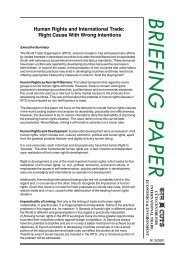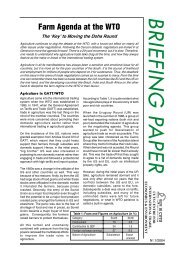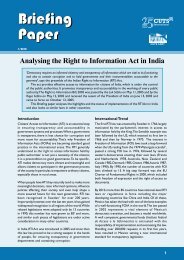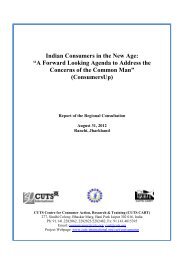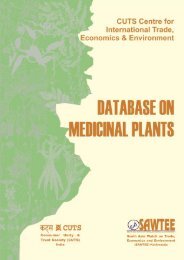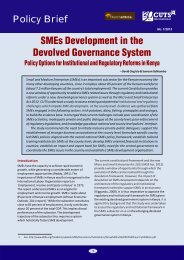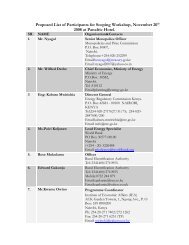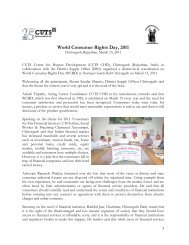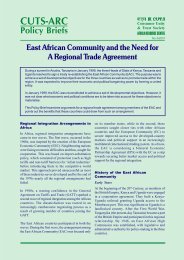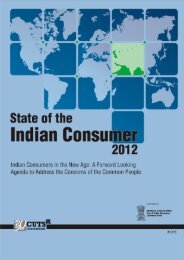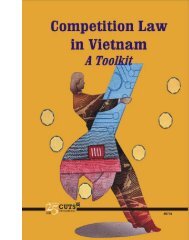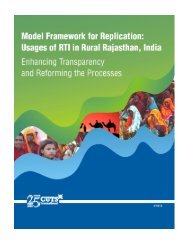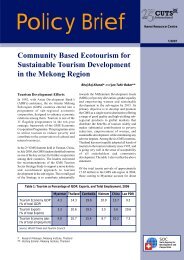Final Report - World Trade Organization
Final Report - World Trade Organization
Final Report - World Trade Organization
You also want an ePaper? Increase the reach of your titles
YUMPU automatically turns print PDFs into web optimized ePapers that Google loves.
Table A: Human Resources in the Competition Authorities<br />
India Kenya Pakistan South Africa Sri Lanka Tanzania Zambia<br />
Staff (2000/2001)<br />
Full time members 4 1 3 1 1 1 0<br />
Part time members 0 0 0 8 5 0 12<br />
Professional 23 24 5 37 7 2 5<br />
Support staff 125 6 25 32 7 3 6<br />
Total 152 31 33 78 20 5 23<br />
l<br />
be interesting to note that 49 percent of the<br />
budget (1999/2000) of the South African<br />
Competition Commission was obtained from<br />
filing fees paid by companies seeking a merger.<br />
The budgets of the three South Asian competition<br />
authorities, as a percentage of the respective<br />
government’s total expenditure, are much lower<br />
than those of the African countries in the project.<br />
In relative terms, India’s competition authority<br />
has the smallest budget and the Zambian and<br />
South African competition regimes have the<br />
largest. Figure A provides the details.<br />
Personnel<br />
l The competition authorities find it very difficult<br />
to attract and retain competent and qualified<br />
staff. Most of them maintain a skeleton staff. In<br />
countries where the numbers are higher, the staff<br />
mainly comprises support staff and not<br />
professionals. For details, see Table A.<br />
l The professional staff of all the seven competition<br />
authorities is dominated by economists. There is<br />
a general shortage of lawyers. Besides, even<br />
where the professionals have an economic or<br />
legal background, their skills are not of the<br />
required standard.<br />
l The process of recruitment is not systematic and<br />
is not taken very seriously in most of the<br />
countries. Lack of training facilities available to<br />
the professional staff aggravates the problem.<br />
l Lack of funds and proper salary scales are two<br />
key reasons why the competition authorities have<br />
been unable to attract top quality economists and<br />
lawyers. Except in Zambia and South Africa,<br />
the salaries paid are considerably lower than the<br />
salaries paid in the private sector. Even the<br />
agencies of Zambia and South Africa have<br />
difficulties in attracting and retaining competent<br />
staff. In Sri Lanka, the professional staff<br />
members are paid salaries that are lower than<br />
even those in the government sector.<br />
Case Handling<br />
l Adequacy of legal provisions is the most important<br />
aspect of a competition regime determining its<br />
l<br />
l<br />
l<br />
l<br />
l<br />
effectiveness. The inadequacy or lack of legal<br />
clarity in dealing with cases, though prevalent in<br />
all countries, was most prominent in the case of<br />
India. The lack of research and investigative<br />
capacity in the seven countries makes it very<br />
difficult for the competition authorities to deal<br />
with cases judiciously.<br />
In most of the competition regimes, competition<br />
cases take unusually long to deal with. This can<br />
be partly explained by the lackadaisical attitude<br />
of the staff, especially in the authorities of the<br />
South Asian members.<br />
Further, the authorities in some countries are not<br />
manned by the right kind of people. In such<br />
situations, dealing with cases with an international<br />
dimension is an even greater problem, as the<br />
authorities are oblivious of the activities and<br />
prosecution of international cartels in developed<br />
countries and hence do not take action such<br />
cartels in their own countries. Moreover, little<br />
attempt is made to communicate with the<br />
competition authorities of developed countries for<br />
information and cooperation to handle<br />
international cases. Notably, the losses inflicted<br />
by such cartels are substantial in developing<br />
countries as evident in Table B that provides<br />
estimates of losses in the 7-Up countries due to<br />
the notorious vitamins cartel.<br />
The autonomy of a competition authority is of<br />
crucial importance for the effective handling of<br />
cases. In all 7-Up countries, except in Kenya<br />
and Tanzania, competition authorities are de jure<br />
autonomous. Yet government interference is<br />
quite evident. In Sri Lanka, although government<br />
interference permeates the system, it is not<br />
apparent so far as handling of cases is concerned.<br />
There are other kinds of external influence on<br />
the competition authorities as well. Sometimes,<br />
they get swayed by public opinion/emotions or<br />
national sentiments and take decisions not in the<br />
best interests of competition.<br />
Lobbying by different interest groups can make<br />
a difference in many jurisdictions. It was<br />
generally observed that businesses are more<br />
active in lobbying and consumer movements are<br />
Pulling Up Our Socks w ix



